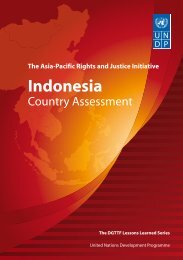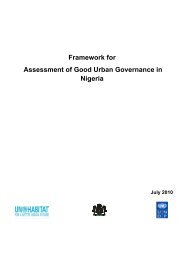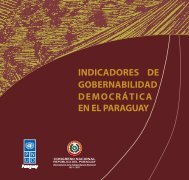A Users' Guide to Measuring Local Governance
A Users' Guide to Measuring Local Governance
A Users' Guide to Measuring Local Governance
Create successful ePaper yourself
Turn your PDF publications into a flip-book with our unique Google optimized e-Paper software.
16<br />
<strong>Governance</strong> for <strong>Local</strong> Development Index (GOFORDEV Index)<br />
Producer<br />
Philippines Center for Policy Studies (PCPS) –<br />
<strong>Governance</strong> Project<br />
His<strong>to</strong>ry<br />
The <strong>Governance</strong> Project of the Philippines Center<br />
for Policy Studies (PCPS) was initiated in 1999 <strong>to</strong><br />
support the implementation of the country’s fiscal<br />
decentralization program. This was <strong>to</strong> be achieved<br />
through the development, adoption and<br />
institutionalization of a performance assessment<br />
system for urban municipal governments. The<br />
<strong>Governance</strong> for <strong>Local</strong> Development (GOFORDEV)<br />
Index was developed during the first two phases of<br />
the project. Indica<strong>to</strong>rs were selected <strong>to</strong> provide the<br />
essential information required for a reasonable<br />
assessment of local governance. The initial list of<br />
indica<strong>to</strong>rs was validated in two focus group<br />
discussions held in January 2001 which were<br />
attended by 22 local stakeholders. Comments and<br />
suggestions on the conceptual framework, the<br />
initial list of proposed indica<strong>to</strong>rs and the survey<br />
questionnaire were incorporated in the final<br />
indica<strong>to</strong>r set and survey questionnaire.<br />
Objectives<br />
The GOFORDEV Index is a set of indica<strong>to</strong>rs that<br />
measures the quality of governance at the municipal<br />
level. Moreover, it provides an opportunity for<br />
greater and more focused interactions between<br />
citizens and local officials. Once adopted, the Index<br />
is expected <strong>to</strong> promote local development<br />
through more transparent, accountable and<br />
participa<strong>to</strong>ry governance.<br />
Applicability<br />
The Index has been applied in 41 municipalities<br />
across the Philippines. It can be used in both urban<br />
and rural areas, and also with local governments<br />
that have limited capacities.<br />
Types and sources of data used<br />
Both qualitative and quantitative data are used.<br />
Qualitative data are collected through household<br />
surveys. Qualitative data as well as quantitative<br />
measures are also obtained from available public<br />
documents such as minutes of the meetings of the<br />
local consultative bodies and the annual audited<br />
financial report of the local government.<br />
Information is both subjective and objective.<br />
Methodology<br />
The GOFORDEV Index is a simple average of three<br />
sub-indices – the Development Needs Index, the<br />
Development Orientation Index, and the<br />
Participa<strong>to</strong>ry Development Index. Each of these in<br />
turn comprise a <strong>to</strong>tal of 10 indica<strong>to</strong>rs (see Table<br />
30). Each indica<strong>to</strong>r provides a result that can be a<br />
percentage or a score between 0 and 1 (0 =<br />
absence; 1 = existence).The data collected are then<br />
processed using the GOFORDEV Index encoding<br />
software. The software is a Windows-based<br />
programme that calculates the scores, generates<br />
statistical tables, and prints the presentation<br />
materials. The final score ranges from 0 <strong>to</strong> 100. The<br />
proximity of the score <strong>to</strong> 100 indicates how close<br />
the LGU is <strong>to</strong> “good governance”.<br />
Key ac<strong>to</strong>rs/stakeholders<br />
The implementation of the GOFORDEV Index is<br />
undertaken by the local governments, other<br />
government offices and civil society organizations,<br />
with the support of the Philippines Center for<br />
Policy Studies. <strong>Local</strong> governments have a central<br />
role as they provide much of the information<br />
requested and are also responsible for the<br />
follow-up.<br />
Results reporting format<br />
The results are tabulated and communicated<br />
through public presentations. <strong>Local</strong> partners<br />
implementing the Index are invited <strong>to</strong> organise<br />
public meetings involving peoples’ organizations,<br />
NGOs, church groups, business groups, and local<br />
officials, <strong>to</strong> elicit feedback and suggestions on the<br />
scores. This also helps in identifying priority areas<br />
for intervention. Table 31 presents the results for<br />
the GOFORDEV Index in two pilot areas for 2001.<br />
A Users’ <strong>Guide</strong> <strong>to</strong> <strong>Measuring</strong> <strong>Local</strong> <strong>Governance</strong> 121




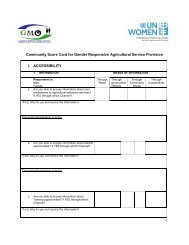

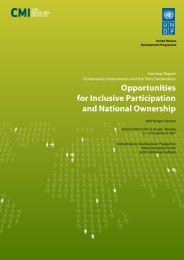
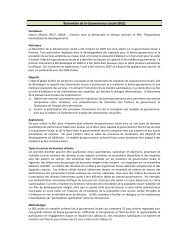
![GuÃa del Usuario ] - Governance Assessment Portal](https://img.yumpu.com/44740603/1/190x253/gua-a-del-usuario-governance-assessment-portal.jpg?quality=85)
